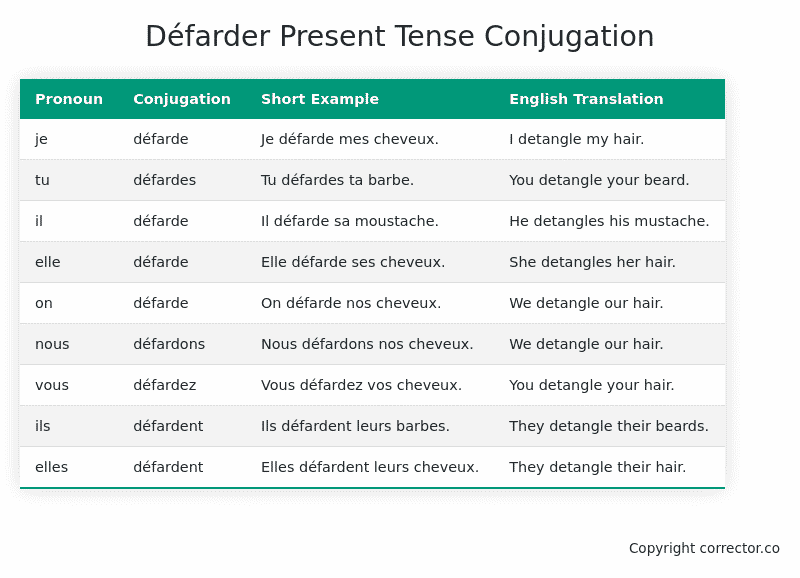Le Present (Present Tense) Conjugation of the French Verb défarder
Introduction to the verb défarder
The English translation of the French verb “défarder” is “to remove makeup”. The infinitive form “défarder” is pronounced as “day-far-day”.
The word “défarder” originates from the combination of the prefix “dé-” (indicating reversal or removal) and the verb “farder” (meaning “to apply makeup”). It is most often used in everyday French to refer to the action of taking off or removing makeup from the face.
Examples of usage:
-
Je me défarde tous les soirs avant de me coucher.
(I remove my makeup every night before going to bed.) -
Elle utilise un démaquillant pour bien défarder son visage.
(She uses a makeup remover to thoroughly remove her makeup from her face.) -
Nous avons besoin de produits doux pour défarder nos yeux sensibles.
(We need gentle products to remove makeup from our sensitive eyes.)
Note: The translations provided are for illustrative purposes and may vary depending on the context.
Défarder – About the French Present Tense
To take a deep dive into all the French tenses then see our article on Mastering French Tense Conjugation.
Common Everyday Usage Patterns For Le Present
Interactions with Other Tenses
Table of the Present Tense Conjugation of défarder
| Pronoun | Conjugation | Short Example | English Translation |
|---|---|---|---|
| je | défarde | Je défarde mes cheveux. | I detangle my hair. |
| tu | défardes | Tu défardes ta barbe. | You detangle your beard. |
| il | défarde | Il défarde sa moustache. | He detangles his mustache. |
| elle | défarde | Elle défarde ses cheveux. | She detangles her hair. |
| on | défarde | On défarde nos cheveux. | We detangle our hair. |
| nous | défardons | Nous défardons nos cheveux. | We detangle our hair. |
| vous | défardez | Vous défardez vos cheveux. | You detangle your hair. |
| ils | défardent | Ils défardent leurs barbes. | They detangle their beards. |
| elles | défardent | Elles défardent leurs cheveux. | They detangle their hair. |
Other Conjugations for Défarder.
Le Present (Present Tense) Conjugation of the French Verb défarder (You’re reading it right now!)
Imparfait (Imperfect) Tense Conjugation of the French Verb défarder
Passé Simple (Simple Past) Tense Conjugation of the French Verb défarder
Passé Composé (Present Perfect) Tense Conjugation of the French Verb défarder
Futur Simple (Simple Future) Tense Conjugation of the French Verb défarder
Futur Proche (Near Future) Tense Conjugation of the French Verb défarder
Plus-que-parfait (Pluperfect) Tense Conjugation of the French Verb défarder
Passé Antérieur (Past Anterior) Tense Conjugation of the French Verb défarder
Futur Antérieur (Future Anterior) Tense Conjugation of the French Verb défarder
Subjonctif Présent (Subjunctive Present) Tense Conjugation of the French Verb défarder
Subjonctif Passé (Subjunctive Past) Tense Conjugation of the French Verb défarder
Subjonctif Imparfait (Subjunctive Imperfect) Tense Conjugation of the French Verb défarder
Subjonctif Plus-que-parfait (Subjunctive Pluperfect) Tense Conjugation of the French Verb défarder
Conditionnel Présent (Conditional Present) Tense Conjugation of the French Verb défarder
Conditionnel Passé (Conditional Past) Tense Conjugation of the French Verb défarder
Conditionnel Passé II (Conditional Past II) Tense Conjugation of the French Verb défarder
L’impératif Présent (Imperative Present) Tense Conjugation of the French Verb défarder
L’impératif Passé (Imperative Past) Tense Conjugation of the French Verb défarder
L’infinitif Présent (Infinitive Present) Tense Conjugation of the French Verb défarder
L’infinitif Passé (Infinitive Past) Tense Conjugation of the French Verb défarder
Le Participe Présent (Present Participle) Tense Conjugation of the French Verb défarder
Le Participe Passé (Past Participle) Tense Conjugation of the French Verb défarder
Struggling with French verbs or the language in general? Why not use our free French Grammar Checker – no registration required!
Get a FREE Download Study Sheet of this Conjugation 🔥
Simply right click the image below, click “save image” and get your free reference for the défarder present tense conjugation!

I hope you enjoyed this article on the verb défarder. Still in a learning mood? Check out another TOTALLY random French verb present conjugation!


